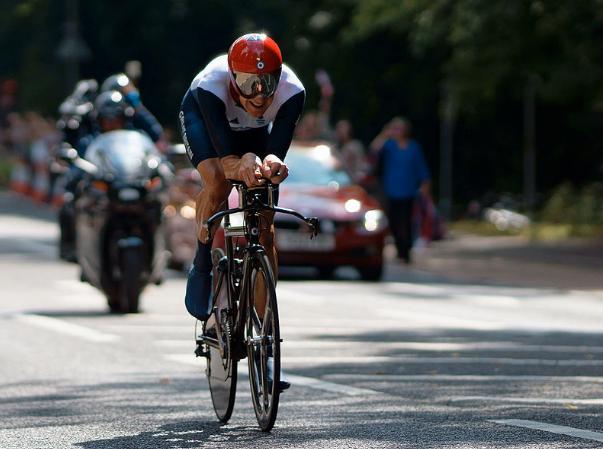- News
- Reviews
- Bikes
- Components
- Bar tape & grips
- Bottom brackets
- Brake & gear cables
- Brake & STI levers
- Brake pads & spares
- Brakes
- Cassettes & freewheels
- Chains
- Chainsets & chainrings
- Derailleurs - front
- Derailleurs - rear
- Forks
- Gear levers & shifters
- Groupsets
- Handlebars & extensions
- Headsets
- Hubs
- Inner tubes
- Pedals
- Quick releases & skewers
- Saddles
- Seatposts
- Stems
- Wheels
- Tyres
- Tubeless valves
- Accessories
- Accessories - misc
- Computer mounts
- Bags
- Bar ends
- Bike bags & cases
- Bottle cages
- Bottles
- Cameras
- Car racks
- Child seats
- Computers
- Glasses
- GPS units
- Helmets
- Lights - front
- Lights - rear
- Lights - sets
- Locks
- Mirrors
- Mudguards
- Racks
- Pumps & CO2 inflators
- Puncture kits
- Reflectives
- Smart watches
- Stands and racks
- Trailers
- Clothing
- Health, fitness and nutrition
- Tools and workshop
- Miscellaneous
- Buyers Guides
- Features
- Forum
- Recommends
- Podcast
news
Bradley Wiggins' liquidated businesses owe over £1m; Misleading 'Dutch Reach Challenge' TikTok vid "unfortunate", say Cycling UK; Froome dropped on Vuelta stage 1; Decathlon revive 2005 Ti racer as 'GRVL' bike + more on the live blog
SUMMARY
 Bradley Wiggins (via Eurosport)
Bradley Wiggins (via Eurosport)20 October 2020, 16:29
Businesses co-controlled by Bradley Wiggins liquidated, with debts of over £1 million
Two businesses that list Bradley Wiggins as a director are now insolvent, with Wiggins Rights Limited owing over £654,000 and New Team Cycling Ltd owing £587,000. According to the statement of affairs documents listed by Companies House, the biggest debt is to HM Revenue and Customs, which is owed £272,000 by Wiggins Rights Limited. It also owes 101 Ride Ltd, another company that names Wiggins as a director, £238,000, while New Team Cycling Ltd owes thousands to companies such as Pinarello and Trinity Sports Management.
The statement of affairs for Wiggins Rights Ltd said creditors are likely to be left £54,000 short of the total money owed, and the assets available for preferential creditors are listed as "uncertain" for both Wiggins Rights Ltd and New Team Cycling Ltd. Wiggins' ex-wife Cath is also named as a director for both companies.
A spokesperson for Bradley Wiggins told Cycling Weekly that his involvement "was not on a day to day", adding: “Experienced professionals were trusted to run both the financial and operational elements of the businesses. It must also be made clear that an investigation into lost assets is still underway. For clarity this in no way affects Bradley’s personal solvency.”
In July, Wiggins was the subject of a bankruptcy petition from HMRC, with London's High Court hearing how he had been facing financial struggles. The hearing lasted five minutes, with Wiggins' lawyers telling the judge that they had met with HMRC representatives on 14th July to agree a solution. The petition was dismissed, and Wiggins was ordered to pay £916 to cover HMRC's costs from the hearing.
20 October 2020, 16:17
Endura release new mini-doc on Graeme Obree
The legendary 'Flying Scotsman' touches on his mental health struggles, his impressive physical fitness at the age of 55 and how much he still just loves riding his bike - well worth 14 minutes of your time.
20 October 2020, 16:07
Froome finished over 11 minutes down
Finishing in 71st place, Froome's Vuelta is already over. Thibaut Pinot finished almost 10 minutes off the winner, while Dumoulin is left with a glimmer of hope after dropping 'just' 51 seconds.
20 October 2020, 15:50
Froome nowhere near the top 10 on opening Vuelta stage
Roglic, Carapaz, Martin y Chaves.
Así fue el 1, 2, 3 y 4 en la primera etapa de la #LaVuelta2020Froome, muy lejos de sus años de gloria.
Y Daniel Felipe Martínez, increíblemente, se cayó de nuevo a mitad de la etapa. pic.twitter.com/bkkJyejGfT
— Mauricio Silva G. (@msilvaazul) October 20, 2020
Tom Dumoulin is also out of contention after the opening stage - full story to follow.
20 October 2020, 15:44
Vuelta: Roglic wins stage 1, Froome dropped
🏁Etapa 1 | Stage 1
🙋🏻♂️🏆 ¡PRIMOZ ROGLIC @rogla, ganador en Arrate! 🏆#LaVuelta20 pic.twitter.com/fSnDQa4mtt
— La Vuelta (@lavuelta) October 20, 2020
🎥El sufrimiento de Froome (@INEOSGrenadiers) para seguir el ritmo en el Alto de Elgeta / 🇬🇧 Hard efforts by former winner @chrisfroome to keep the pace from the bunch at Elgeta climb! #LaVuelta20 pic.twitter.com/K2V8EuZfUU
— La Vuelta (@lavuelta) October 20, 2020
It looks like it could be too much of an ask for Froome to compete for the red jersey, as he's already lost a big chunk of time on stage 1. Primoz Roglic won the stage, while Froome's Ineos teammate Richard Carapaz came second.
We're just waiting to find out exactly how much time Froome lost.
20 October 2020, 15:21
Cycling UK comment on problematic Dutch Reach video on TikTok
The video from insurance firm Veygo, which can be found further down this page, incorrectly shows us how to do the Dutch Reach through the medium of dance, as the star of the video opens her car door with her right hand.
Cycling UK, who themselves teamed up with Uber for a Dutch Reach video last year and have campaigned for the technique to be introduced to the UK driving test, are mentioned in the article surrounding ther campaign video, but have called it "unfortunate".
Keir Gallagher, Cycling UK’s campaigns manager, told road.cc: “I think it’s great to see the Dutch Reach reaching new audiences, with the insurance industry getting behind it and trying to promote its use to new drivers. That’s always been part of our goal at Cycling UK, spreading the message far and wide.
“However, it’s unfortunate that Veygo have missed out a crucial part of the Dutch Reach – using the opposite hand to open the door – and that the driver turns away from the window before opening the door without looking. This just shows the importance of communicating the upcoming changes to the Highway Code accurately.
“Cycling UK would always urge companies like Veygo to get in touch with us to avoid making simple mistakes like this, as we’re always more than happy to provide advice and assistance to help promote road safety.”
20 October 2020, 14:45
"Blighted by bikes": Amsterdam gets tough on bikes tied to bridges... by installing flower baskets
The last place you'd expect comments that could be seen as negative towards the humble bicycle is the Netherlands... but this time even Amsterdam has been pushed too far, after the council say that the huge number of bikes tied to railings on the city's many bridges are spoiling the views, and forcing pedestrians into the road due to deep piles of bikes on the narrow pavements.
A spokesman told The Guardian: “Due to the large number of bicycles parked at the bridge railings, pedestrians no longer fit on the narrow sidewalks and walk on the roadway. This creates unsafe situations.”
Rather than fines or heavy policing, Amsterdam have chosen a more Amsterdam style of prevention by putting in flower baskets to deter potential bike parkers... that'll teach 'em.
20 October 2020, 14:36
Decathlon relaunch 15-year-old titanium racer as super trendy 'GRVL' bike
Rather than creating a new Ti gravel bike from the ground up, it looks like Decathlon have simply added some tyre clearance and removed some vowels to pronounce their classic Decathlon 9.5 Titane frameset as their new Triban GRVL Ti 900. It originally came out in 2005, but has now shifted "from cobblestones to gravel", say Decathlon - full story on off.road.cc.
20 October 2020, 14:30
Giro d'Italia: Jan Tratnik wins stage 16
#Giro 🇮🇹 Gran victoria en San Daniele del Friuli para Jan Tratnik 🇸🇮 (Bahrain) tras soltar en el duro repecho del último km a Ben O´Connor 🇦🇺 (NTT). Ellos han sido los más fuertes de la fuga de 28 que ha protagonizado la etapa. pic.twitter.com/ZE3S0eCrWV
— Ciclismo a Fondo (@Ciclismoafondo_) October 20, 2020
The Slovenian triumphed on the hilly 229km stage, blowing away Ben O'Connor of NTT in the final kilometre - that'll be Tratnik's first stage win at a Grand Tour at the age of 30.
20 October 2020, 14:25
Race updates: breakaway getting reeled back in at the Vuelta, and there's a head-to-head battle at the Giro
🏁Km 120 | Etapa 1 - Stage 1 | #LaVuelta20
🇪🇸 La fuga tiene el pelotón cerca tras el Alto de Kanpazar🇬🇧 The break battles as the peloton gets closer
👉https://t.co/izln1uYnJq pic.twitter.com/nLQvjrCmDq
— La Vuelta (@lavuelta) October 20, 2020
Looks like the pack will come together shortly at the Vuelta with 50km to go - all the major contenders are safe.
📢4 km to go!
📢4 km al termine!
🇬🇧Follow live https://t.co/TlBPO3lAsS
🇮🇹 Segui il live: https://t.co/mKk45RbViY
🇪🇸 Sigue en vivo: https://t.co/vc6duR1oJ2
🇫🇷 Suivre en direct: https://t.co/CIIEaPjcSZ#Giro pic.twitter.com/dtfSs3BOMP— Giro d'Italia (@giroditalia) October 20, 2020
At the Giro there is under 3km to go now, with Jan Tratnik and Ben O'Connor duking it out at the front.
20 October 2020, 12:32
Only one person was fined for breaking coronavirus restrictions at the Tour of Flanders... the Belgian PM's father
Herman De Croo, the father of current Belgian Prime Minister Alexander De Croo and Belgium's longest-serving politician, was the only person who was reported for breaking coronavirus restrictions at the Belgian classic on Sunday.
De Croo was fined for not wearing a mask, and was caught on camera without one when cyclists drove past his home in Brakel.
He told Het Nieuwsblad: “I made a mistake and should indeed have worn a face mask."
“It doesn’t matter whether I was all alone at home or not. Everyone along the entire route of the Tour is obliged to wear a face mask. I should have known that and will pay the fine.”
Despite the one ministerial hiccup, the governor of East Flanders Carina Van Cauter said the event was a success: "The fans have behaved in an exemplary manner, proving that cycling can be corona-proof. A boost for the future", she said.
20 October 2020, 12:24
13-year-old arrested on suspicion of attempted murder after stabbing a man and stealing his bike
West Midlands Police say that the victim, a man in his 60s, was found with serious injuries from stab wounds in Chapel Walk, Kings Norton. It's believed the man was robbed of his bike, a Specialized Crosstrail Elite Disc 2016 model, by two people at around 1.50pm on 16th October.
This morning, a 13-year-old boy was detained from an address in the Kings Norton area, after acting on information received from an appeal. Police say the victim remains in a critical but stable condition in hospital, and are continuing to ask anyone with information to contact police by calling 101 and quoting log 2383, or using their Live Chat function.
20 October 2020, 12:02
Cycle tourism 'worth more than entire cruiseship sector in Europe', according to new infographic
I did not know this. https://t.co/VtHURwrMDU
— Chris Boardman (@Chris_Boardman) October 19, 2020
Chris Boardman didn't know it, and neither did we... but according to these figures shared by Henk Swarttouw, the vice-president of the European Cyclists' Federation, cycle tourism is quite a lot more valuable than cruise tourism in terms of revenue and number of jobs generated.
20 October 2020, 11:53
Team presentations with facial recognition sign-on: welcome to the (very weird) future
🇪🇸 #LaVuelta20
Team presentation @lavuelta with sign on ✍️ done using facial recognition 😀 pic.twitter.com/yUgsBxqpmI
— Trek-Segafredo (@TrekSegafredo) October 20, 2020
Imagine watching this video in 2019 and trying to work out what's going on?
20 October 2020, 11:01
“I don’t feel like I’m anywhere close to finished”: Chris Froome is ready for the Vuelta
Ready to take on the 2020 @lavuelta, my last race for the @INEOSGrenadiers! Let’s do this 👍 pic.twitter.com/wjLcBmJttv
— Chris Froome (@chrisfroome) October 20, 2020
Will this be the comeback to end all comebacks for the two-time Vuelta winner? Froome also gave an interview with the BBC yesterday, saying that he feels like his career is far from over...
“I don’t feel like I’m anywhere close to finished” 💪@chrisfroome says he feels he’s been given a second chance after a horrific crash last year.
He’s racing in the #Vuelta which starts tomorrow. His final race for @INEOSGrenadiers 🚴♂️#5LiveBreakfast
🎧 Listen @BBCSounds pic.twitter.com/OoLwCrBax3
— BBC Radio 5 Live (@bbc5live) October 19, 2020
Detailing his long and slow recovery, Froome says he feels like he's been given a "second chance" after recovering from his horror crash last year, and hopes to carry on racing at the top level for "another few years".
20 October 2020, 10:43
Sam Bennett is apparently Belgian now
Can't wait to see the new jersey 😅 pic.twitter.com/crIjZnavtb
— Stas (@badgerbaroudeur) October 20, 2020
The Quick-Step man, and proud Irishman, has been mistakenly issued with race numbers that have Belgian flags on them for the opening stage of the Vuelta... although it seems he has seen the funny side.
It's not the first time the Tour de France green jersey winner has had his nationality called into question; last month, Bradley Wiggins caused a fair bit of offence by saying live on Eurosport "we [British people] can almost consider him [Bennett] British."
The show's other guest Sean Kelly was not amused, saying Wiggins couldn't "claim" Bennett... before Wiggins appeared to make matters worse by mocking Kelly's accent.
20 October 2020, 09:47
Insurance company Veygo launch the 'Dutch Reach Challenge' TikTok video... but something's very wrong
DISCLAIMER: THE BELOW VIDEO IS NOT HOW YOU DO THE DUTCH REACH
Let's protect cyclists and do the Dutch Reach together ##Veygodutchreach ##Tiktokchallenge ##Drivingtips ##Fyp ##Cycling ##Drivingchallenge
Their intentions were good we're sure, but unfortunately this TikTok video that attempts to show us how to do the Dutch Reach falls dangerously short.
The Dutch Reach technique is encouraged to prevent the dooring of cyclists and motorbike riders, and means you open the car door with your hand furthest away from the door (your left hand in the UK) so you naturally look behind you when opening it. Veygo's TikTok video looks to be heading in the right direction, with the dancing driver taking her left arm and looking round... but then inexplicably, she turns to the camera to give us the thumbs-up, and opens the door with her right hand anyway.
If you want to show your kids how not to do it, show them the video above. If you want to teach them the proper technique, see the video below from Cycling UK.
20 October 2020, 10:25
A warm welcome awaits sprinters at the Vuelta
When we say warm, we mean very sweaty warm... because there are some truly brutal climbs in the opening three stages. The above profile is just the first one, with vicious category 1 climbs featuring in stages two and three.
20 October 2020, 09:33
Full story on the Colombian's second positive test
20 October 2020, 08:49
Strava reveal COVID-19 has hit pro athletes' mental health and finances hard
The research from Strava and Stanford University has found that of 131 athletes - all cyclists, triathletes and runners - 60% were facing difficulty training due to the impact of the pandemic on their mental health. Increasing mental health issues and financial worries were also found to be impacting athletes' performance, with 70% saying they were worried about their finances and 22.5% revealing that they have felt "down or depressed" during the pandemic.
Additionally, 62% reported difficulty exercising, and 28% said they felt "nervous or anxious". 46% saw a reduction in paid sponsorship opportunities, which has negatively affected women (54%) more than men (44%).
An increase on isolation and solitary training has also affected athletes' mental health, with just 21% training with a partner or group three times a week during the pandemic compared to 54% before. Just 12% are now training with a team every day.
Olympic gold medallist and track world champion Elinor Barker, has spoken out, saying: “It’s been an unusual year as a professional cyclist, and there’s definitely been an impact on training habits and routines – from facing greater isolation and missing your teammates, to battling through days lacking proper motivation, there’s been plenty of obstacles.
"Having no real competition to aim for, and with a lack of a proper challenge, I’ve had to find new ways to keep myself sharp and focused.
"Overall, I’ve actually managed to improve my fitness, as I’ve never had such a prolonged period of time dedicated solely to training. With no travel and competitions, suddenly I’ve had a proper off-season for the first time in my career – and I’ve made sure to make it count.
“Throughout the Covid-19 crisis I’ve felt well supported by my club and my teammates, and I’m hopeful that more broadly, governing bodies will do all in their power to provide a safety net for cyclists in this uncertain time.”
20 October 2020, 08:41
Fernando Gaviria tests positive for coronavirus again
UAE Team Emirates say that the Colombian won't start stage 16 of the Giro d'Italia - here's their statement:
After undergoing a PCR test on yesterday’s Giro d’Italia rest day, UAE Team Emirates’ Fernando Gaviria has tested positive for COVID-19.
All other riders and staff returned a negative test, and will undergo further testing today.
The teams medical staff are monitoring the situation closely and doing all they can to ensure the we can proceed safely.
Gaviria was immediately isolated following the test result and is feeling well and is completely asymptomatic. This is the second time the Colombian has tested positive for the virus, after also having it in March.
Jack has been writing about cycling and multisport for over a decade, arriving at road.cc via 220 Triathlon Magazine in 2017. He worked across all areas of the website including tech, news and video, and also contributed to eBikeTips before being named Editor of road.cc in 2021 (much to his surprise). Jack has been hooked on cycling since his student days, and currently has a Trek 1.2 for winter riding, a beloved Bickerton folding bike for getting around town and an extra beloved custom Ridley Helium SLX for fantasising about going fast in his stable. Jack has never won a bike race, but does have a master's degree in print journalism and two Guinness World Records for pogo sticking (it's a long story).
Add new comment
11 comments

Gkam84
|
4 years ago
0 likes
investigation into lost assets is still underway
I believe that relates to the "New Cycling Team Ltd"....Aka Team Wiggins. A number of bikes and even more wheels are still outstanding from what I've been told and haven't been traced or are believed to have been sold out without permission...
Between the two companies, they owe 101 Ride Limited, Cath Wiggins company £604,000. Wiggins Rights owes New Cycling Team Ltd £29,000
Take off what they own themselves through 101 and from Wiggins Rights to New Cycling Team Ltd, they only owe £608,665.16
So if they are going to come up £54,000 short, surely they shouldn't pay themselves out and cover everything else? Also, the only shareholders listed on New Cycling Team Ltd are 101 Ride Limited....
Their accounting firm SRLV is due £117, 067 over both companies. Did they not spot the issue before it got to this?
The priority should be HRMC £329,974 and the individual persons named like Dan Tullet



eburtthebike
|
4 years ago
1 like
The Dutch reach; which to go for? the short, snazzy attention grabbing but wrong segment, or the long, worthy, but right movie? I can't help thinking that they should combine the two and make a short, snazzy attention grabbing but right segment.
But thanks for the info about the insurance company Veygo, definitely off my list for insuring anything.


Latest Comments
- stonojnr 1 sec ago
But not as the Grand Depart, both 74 and 94 were stages after the 1st stage had happened, only 07 and 14 started Le Tour. I think that's why Cav...
- stonojnr 10 min 38 sec ago
I get pullouts like that more regularly than 1 in 10 years for sure. ...
- KiwiMike 27 min 28 sec ago
Folks, is this news because he's the brother-in-law of a former FM? Are you insinuating some sort of connivance? Based on what evidence?...
- Rendel Harris 35 min 25 sec ago
The fallback of conspiracy theorists everywhere, the official figures don't accord with the theory I am trying to promulgate and therefore the...
- OldRidgeback 1 hour 9 min ago
What the Frankenbike needs is some good old L-shaped cranks
- wtjs 1 hour 34 min ago
right, there aren't double yellows, no loading kerb marks, regulation signs at designated intervals, no policemen witness me parking......
- David9694 1 hour 40 min ago
'I've had tons of death threats on email because I drive a Tesla'...
- Backladder 1 hour 51 min ago
Never mind the PPE, what about Rishi's chopper?
- Mr Anderson 4 hours 9 min ago
I decided to delete my posting immediatley after it was made....
- Jvtrigo 4 hours 33 min ago
Just got my set, the actual weight for rim brakes are 692g front wheel and 860g rear wheel. So a total of 1,552g (with rim tape, and no valve).















